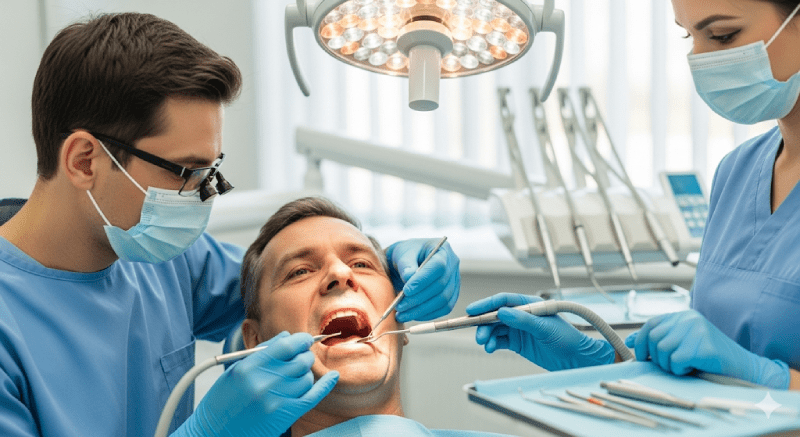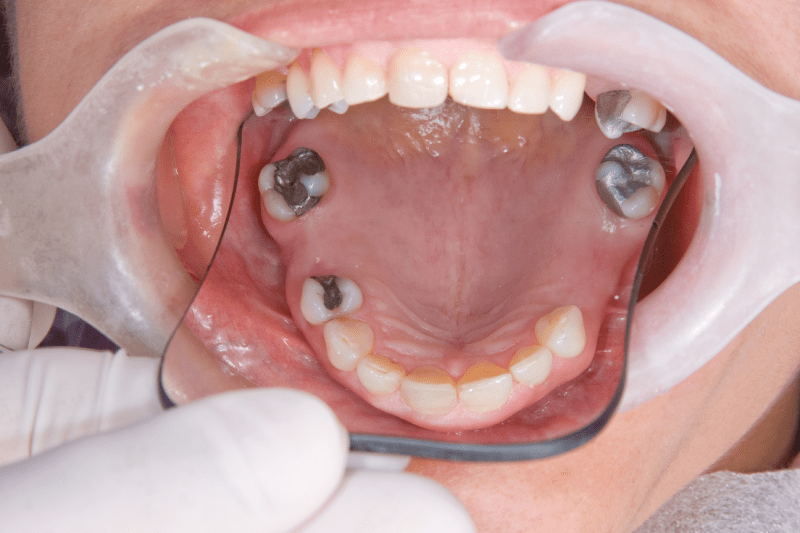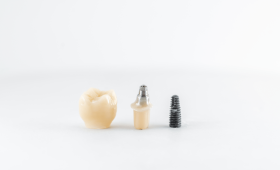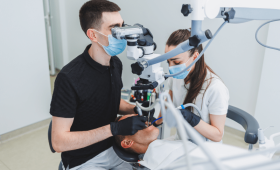What Are the Most Important Factors Affecting Dental Implant Cost in the Netherlands?
The total cost of dental implant treatment in the Netherlands depends on various factors. Among these, the quality of the implant brand to be used, the number of implants required according to the patient’s needs, and the condition of the jawbone are the most important. Prices in the Netherlands can vary depending on the dentist’s experience and the city where the clinic is located. In large cities like Rotterdam, the high costs of clinic rent, personnel, and technological equipment directly affect the prices. Therefore, creating a personalized treatment plan and budget for each patient is very important.
How Much Does a Single Dental Implant Cost in Rotterdam?
Rotterdam is an important port and trade city in the Netherlands, as well as a place where healthcare services are high-cost. The cost of a single dental implant in Rotterdam, depending on the implant brand, the complexity of the surgical procedure, and the dentist’s expertise, can vary between 1,800 Euros and 4,000 Euros. This price generally includes the implant itself, the surgical procedure, and the prosthesis cost. However, the initial examination, X-rays, or additional procedures may not be included in the price.
How Do Dental Implant Prices Vary Across the Netherlands?
In the Netherlands, dental implant prices may be higher in large cities like Amsterdam or Rotterdam, while slightly more affordable prices can be found in smaller towns or rural areas. Price differences are generally related to the clinic’s location, the dentist’s experience, and the scope of services offered. However, due to the generally high living standards and strict healthcare regulations in the country, prices are typically high compared to many other European countries.
What Are the Main Reasons for the High Prices in the Netherlands?
The main reasons for the high prices of dental implants in the Netherlands are the high living standards, the high operational costs of clinics, and strict health regulations. Personnel salaries, insurance, rent, and modern equipment costs are quite high. Furthermore, the education and certification processes for Dutch dentists are meticulously supervised, which increases the quality of their service and, consequently, their prices.
What Are the Costs of Full-Mouth Dental Implants (All-on-4/6) in the Netherlands?
Full-mouth dental implant treatments require a significant cost in the Netherlands. The cost of techniques like All-on-4 or All-on-6 can reach 12,000 Euros to 25,000 Euros or more, depending on the number of implants to be used and the prosthesis material. These prices include both the surgical procedures and the specially prepared full-mouth prostheses. Therefore, a detailed budget analysis is of great importance for patients planning a comprehensive oral restoration.
What Services Are Included in Price Quotes? Can There Be Hidden Costs?
When getting a price quote, it is very important to clarify what is included. The general price may cover the implant, the surgical procedure, and a standard prosthesis. However, additional surgical procedures such as bone grafting, sinus lifting, tooth extraction, or temporary prostheses may be billed separately. To avoid unexpected costs, the treatment plan and cost breakdown should be confirmed in writing, and all possible additional expenses should be clearly stated.
What Is the Cost of Bone Grafting and Sinus Lifting Procedures?
Additional surgical procedures like bone grafting and sinus lifting, applied to patients with insufficient jawbone volume, increase the total cost. In the Netherlands, the cost of these procedures can range from 400 Euros to 2,000 Euros, depending on the complexity of the procedure and the graft material used. These procedures are often critical for a successful implant placement.
What Are the Most Popular Dental Implant Brands in the Netherlands?
Dental clinics in the Netherlands generally use internationally recognized and quality-proven implant brands such as Straumann (Switzerland), Nobel Biocare (Switzerland), Astra Tech (Sweden), and Camlog (Germany). These brands are known for their longevity, high success rates, and excellent integration with the bone.
How Can You Identify a Quality Implant Brand?
A quality implant brand should have proven its success through years of clinical studies. The product having international health certifications like CE or FDA is an important indicator of its reliability. High-quality implants are generally made of biocompatible pure titanium or zirconium. Asking your dentist which brands they use and researching these brands will help you make the right choice.
How Long Does Dental Implant Treatment Take?
Dental implant treatment is generally a two-stage process and can take several months. In the first stage, the implant is placed into the jawbone, and a waiting period of 3 to 6 months is required for it to fuse with the bone (osseointegration). This period varies depending on the patient’s healing rate and bone density. In the second stage, the permanent prosthesis is placed on the implant. If additional procedures like bone grafting are needed, this process can be extended.
What Is the Success Rate of Implant Treatment?
The success rate of dental implants is quite high, generally over 95%. The success rate depends on factors such as the patient’s general health, oral hygiene, habits like smoking, and the surgeon’s experience. When quality implant brands and correct surgical techniques are used, the success rate increases even more. Regular check-ups and good oral care extend the life of the implant.

Is Implant Treatment Painful?
Since dental implant treatment is performed under local anesthesia, no pain is felt during the procedure. Mild pain and swelling may occur after the procedure, but this can be easily controlled with painkillers prescribed by the dentist. Most patients get through the treatment with discomfort similar to a tooth extraction. The recovery process is generally completed within a few days.
Are Clinics in the Netherlands Safe?
The Netherlands is a country with high standards in healthcare services. Dental clinics in the Netherlands are required to comply with high hygiene and safety standards. To choose a reliable clinic, it is important to check the dentists’ professional certificates, the clinic’s certifications, and patient reviews. Getting information about the technological equipment and sterilization methods used by the clinic will also help you confirm its safety.
Does Insurance Cover the Cost of Dental Implants in the Netherlands?
Basic health insurance in the Netherlands generally does not cover the full cost of dental implant treatments, as they are often considered an aesthetic procedure. It may only provide a standard payment (vergoeding) for a basic prosthesis in some cases. Supplemental (aanvullende) health insurance may cover more of the cost depending on the policy’s coverage. It is important for patients to contact their insurance companies to learn about the reimbursement conditions before starting the treatment.
Is Interpreter Support Available During the Treatment Process?
English is widely spoken in the Netherlands, and most clinics can provide English-language services to international patients. However, if you need to communicate in your native language, it would be beneficial to ask in advance if the clinic has interpreter or multilingual staff support.
What Is the Age Limit for Dental Implants?
The minimum age limit for dental implants is the completion of jawbone development, which is generally 18 years of age and older. There is no upper age limit; anyone in good general health can receive implant treatment. The important thing is that chronic diseases are under control and the patient is a suitable candidate for the treatment.
What Are the Most Important Questions to Ask When Getting a Price Quote?
When getting a price quote, you should ask what the price covers, which implant brand will be used, what the additional costs might be, the duration of the treatment, and whether the clinic has interpreter support. Transparent and open communication is very important for a smooth treatment process. Learning about the stages of the treatment and the cost of each stage in detail will help you manage your budget correctly.
What Is the Difference Between Implant Treatment and Bridge Treatment?
While implant treatment mimics the natural structure of a tooth by placing an artificial root in place of a missing tooth, bridge treatment requires the neighboring teeth to be reduced to support the missing tooth. Implants are a more protective treatment method as they can be applied alone without damaging the neighboring teeth.
What Factors Affect the Success of Implant Treatment?
The success of implant treatment depends on the dentist’s experience, the quality of the implant used, the patient’s oral hygiene, and general health status. All these factors must be present together for a successful outcome. Conditions like smoking and uncontrolled diabetes can negatively affect the success rate.
How Are Post-Treatment Check-ups Done?
After the treatment is completed, most clinics provide their patients with a schedule for periodic check-ups. These check-ups are of vital importance for the long-term health of the implant. Patients can usually have these check-ups done by local dentists in their own countries or by returning to the Netherlands.
How Should Places to Stay During the Treatment Process Be Chosen?
Most clinics in the Netherlands are located in city centers or easily accessible areas. You can choose a hotel or an apartment near the clinic for your stay during the treatment. The well-developed public transportation network allows you to travel comfortably within the city.
Is VAT Included in the Dental Implant Price?
The price quotes from dental clinics in the Netherlands are generally presented as VAT (BTW) included. However, it is important to check the invoice details. The VAT rates and exemptions applied to healthcare services may change according to the country’s fiscal policies. Therefore, it is important to clarify this detail when getting a price quote.
What Is the Warranty Period for Implants?
Most implant brands offer a lifetime warranty for the implant itself. This warranty is generally valid in cases where the implant breaks or comes loose. The warranty period for prostheses and other surgical procedures varies according to the clinic and the dentist’s policy. Generally, a warranty of 1-5 years is given for prostheses.
What Are the Additional Costs Affecting the Dental Implant Price?
Additional costs affecting the dental implant price may include the initial examination fee, X-ray fees, medications, anesthesia costs, and non-treatment-related dental care. Therefore, it is useful to learn about all the services and prices offered by the clinic in detail before starting the treatment.
Is There a Quality Difference Between Dutch Dentistry and That of Other Countries?
Dental services in the Netherlands are known for their high standards and strict supervision. The quality difference depends on the individual experience of the dentist, the equipment of the clinic, and the quality of the materials used, rather than the country itself. In general, Dutch dentists have a high professional qualification.
Information on Payment Methods and Currency in the Netherlands
Clinics in the Netherlands generally accept payments in Euros. Payment methods include cash, bank transfer, and credit card. When paying with a credit card, it is important to consider international transaction fees. For large amounts, payment by bank transfer may be more convenient.
What Is the Role of Aesthetics in Implant Selection?
Aesthetics is of great importance in dental implant selection, especially for front teeth. Prostheses made of aesthetic materials like zirconium give a result that is very close to the natural tooth color. The dentist meticulously designs the color, shape, and size of the prosthesis to meet your aesthetic expectations.
In Which Situations Are All-on-4 and All-on-6 Applied in Full-Mouth Prostheses?
The All-on-4 and All-on-6 techniques are fixed prosthesis methods generally applied to patients who are completely toothless or have very few remaining teeth. These techniques, provided the patient’s bone structure is suitable, provide a fast and effective full-mouth restoration. They offer a cost and time advantage compared to traditional implant treatment as fewer implants are used.

How Can the Cost of Dental Implants Be Reduced?
Ways to reduce the cost of dental implants in the Netherlands include researching clinics in smaller cities where costs are lower or getting quotes from multiple clinics to compare them. In addition, getting information about package deals or payment plans offered by the clinic can also be helpful.
In Which Situations Can Implants Not Be Performed?
Dental implants are a treatment method that can be applied in many situations. However, implant treatment can be risky for patients with chronic diseases such as uncontrolled diabetes, severe heart diseases, immune system disorders, or osteoporosis. Oral infections or insufficient bone structure may also require the treatment to be postponed.
How Does the Pre-Treatment Preparation Process Work?
The pre-treatment preparation process begins with the dentist’s intraoral examination and evaluation of the jawbone’s condition with imaging techniques such as panoramic X-rays or 3D tomography. In addition, the patient’s medical history and medications are examined in detail. The most suitable treatment plan is then created based on this information.
What Are the Patient’s Responsibilities for the Success of the Treatment?
For the success of the treatment process, it is very important for the patient to take care of their oral hygiene, stay away from harmful habits like smoking and alcohol, and follow the dentist’s recommendations. Furthermore, not skipping regular post-treatment check-ups is of vital importance for the implant’s long-term health.
Are There Special Packages for Patients from Abroad?
Some clinics in the Netherlands may offer special packages for patients coming from abroad that include additional services such as airport transfers and accommodation. These packages help make the treatment process more comfortable and planned.
How Should Dental Implants Be Cared For?
The care of dental implants is similar to the care of natural teeth. You should brush your teeth at least twice a day and use dental floss and interdental brushes. To keep the tissues around the implants healthy, you should visit your dentist regularly and have professional cleanings.
What Is the Lifespan of Implants?
Well-cared-for and regularly checked dental implants can be used for life. The lifespan of the implant depends on the patient’s oral hygiene, habits like smoking, and general health status. The quality of the implant brand used also plays an important role in its longevity.
Is It Important to Get a Second Opinion?
Before deciding on an important and costly treatment like a dental implant, it is always a good idea to get a second opinion from different clinics. This helps you compare different treatment plans and costs and determine the most suitable option.
How Do Clinics in the Netherlands Provide Support to Patients?
Clinics in the Netherlands generally appoint special patient coordinators to provide support to their patients throughout the treatment process. These coordinators can help you with your questions regarding appointments, payments, and other issues. This service provides great convenience, especially for patients from abroad.



